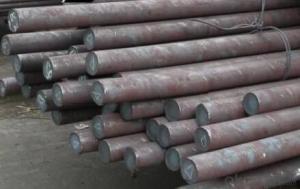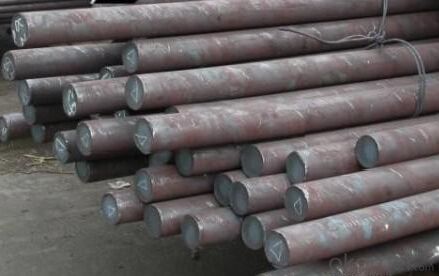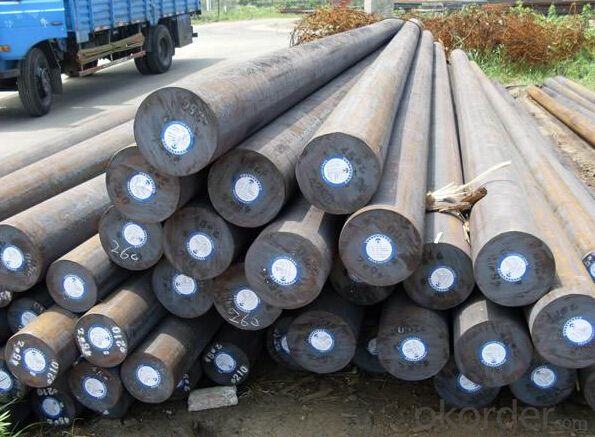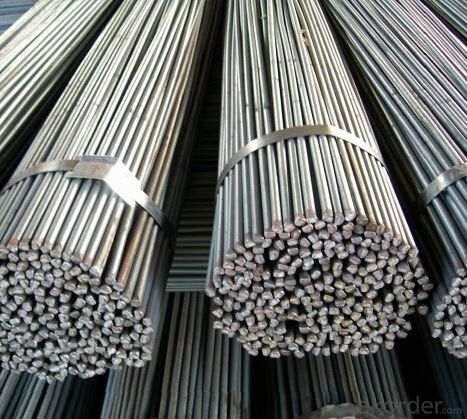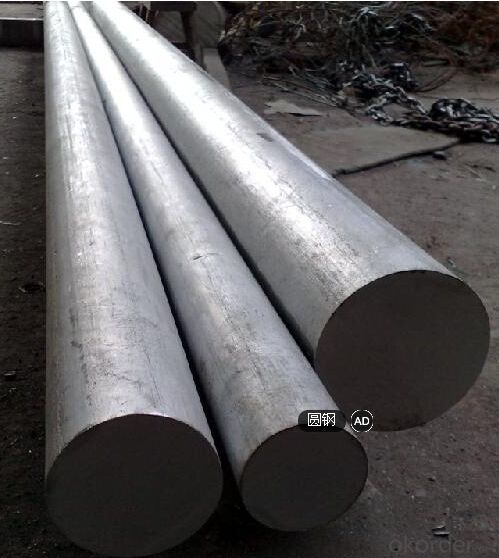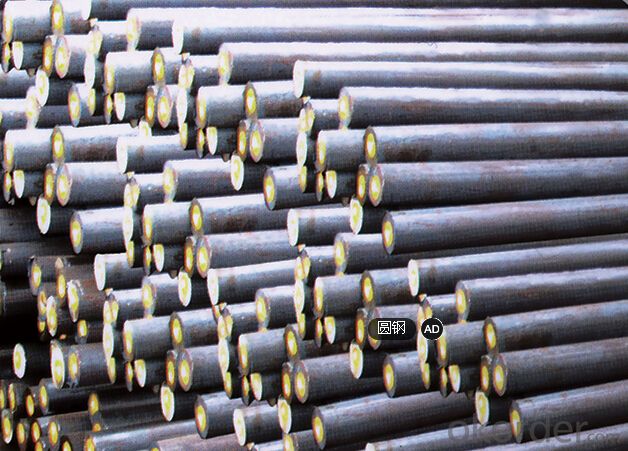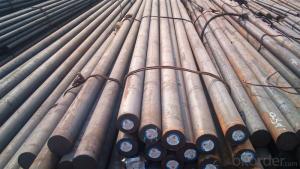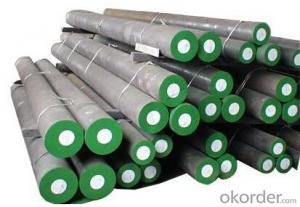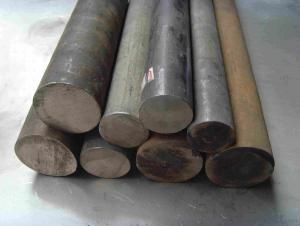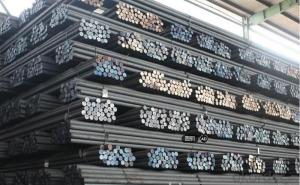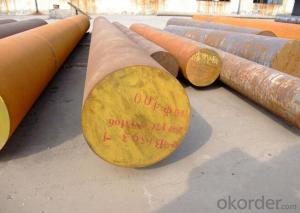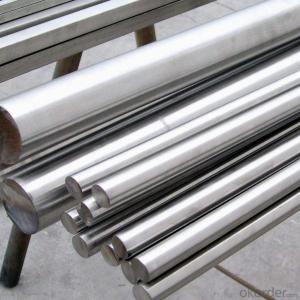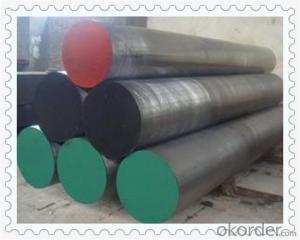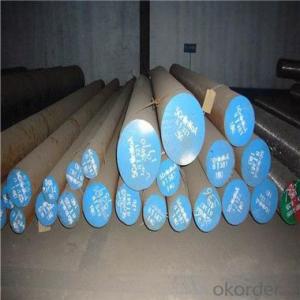Special Steel 8620H 40CrNiMoA Iron Steel Round Bar
- Loading Port:
- Shanghai
- Payment Terms:
- TT OR LC
- Min Order Qty:
- 3 m.t.
- Supply Capability:
- 100000 m.t./month
OKorder Service Pledge
OKorder Financial Service
You Might Also Like
Specification
Special Steel 8620H 40CrNiMoA Iron Steel Round Bar
Details Information of Special Steel 8620H 40CrNiMoA Iron Steel Round Bar
| Name | 8620H 40CrNiMoA Steel Round Bar |
| Shape | Round Bar/Square Bar/Flat Bar/Plate/Wire |
| Standard | GB/ASTM/SAE/AISI/DIN/JIS/EN/BS |
| Surface Treatment: | Black/Peeling/Polished/Machined |
| Delivery Condition: | Hot Rolled or Forged/Peeled or Black Surface |
| Test | SGS/UT 100% Elements Testing |
| Certificate: | ISO/Mill Certificate |
| Service: | 24 hours online service / |
| more than 20 years trading and manufacture | |
| Quality Assurance: | the third party inspection, such as SGS, BV, TUV…etc. is acceptable |
| Packaging Details: | Seaworthy Packaging or as per customer's packing instruction |
| Carbon structure round bar | Q195 Q235A Q235B 10# 20#-55# S45CB |
| Low alloy high strength round bar | Q345A/Q345C/Q345D Q345B Q345E |
| Alloy structure round bar | SAE51B20 20Cr 40Cr 40CrV 20CrMo/30CrMo/35CrMo/42CrMo 20CrMoA/30CrMoA/35CrMoA/42CrMoA/42Cr ML20CrMo/ML30CrMo/ML35CrMo/ML42CrMo B7/SCM435-440 20MnTiB 20CrMnMo 20CrMoH 42CrMoH 40MnB/40MnBH 30Mn2-40Mn2 27SiMn 50CrVA 30CrMnTi |
| Pinion steel | 20CrMnTi 20CrMnTiH 20CrMnTiHCS/20CrMnTiHLD Q20CrMnTi-1/Q20CrMnTi-2 |
| Sucker rod | 20-35CrMoA |
| Free-cutting steel | GT1215S |
| Spring steel | 60Si2MnA 65Mn |
| Ball bearing steel | GCr15 |
Chemical Composition of Special Steel 8620H 40CrNiMoA Iron Steel Round Bar
| C | Si | Mn | P | S | Cr | Ni | Cu |
| 0.17-0.24 | 0.17-0.37 | 0.35-0.65 | ≤0.035 | ≤0.035 | ≤0.25 | ≤0.25 | ≤0.25 |
| Tensile strength (σb/MPa) | Yield strength (σb/MPa) | Elongation (δ5/%) |
| ≥410(42) | ≥245(25) | ≥25 |
Company Introduction of Special Steel 8620H 40CrNiMoA Iron Steel Round Bar
CNBM International Corporation is the most import and export platform of CNBM group(China National Building Material Group Corporation) ,which is a state-owned enterprise, ranked in 270th of Fortune Global 500 in 2015.
With its advantages, CNBM International are mainly concentrate on Cement, Glass, Iron and Steel, Ceramics industries and devotes herself for supplying high quality series of refractories as well as technical consultancies and logistics solution.
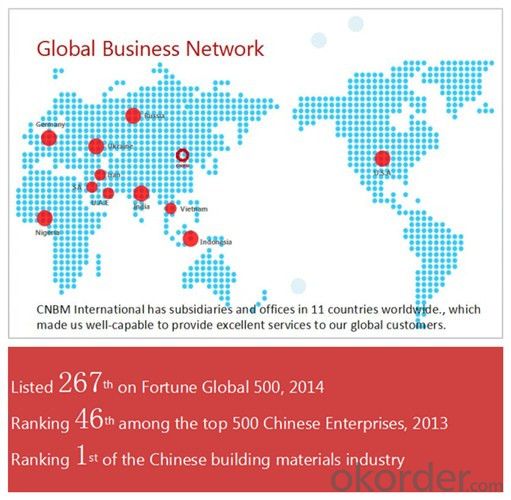
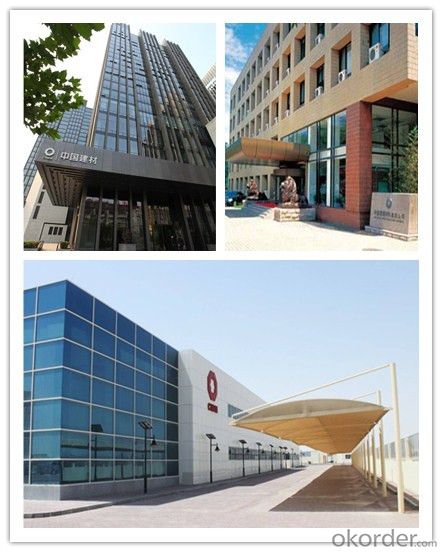
Certificates of Special Steel 8620H 40CrNiMoA Iron Steel Round Bar
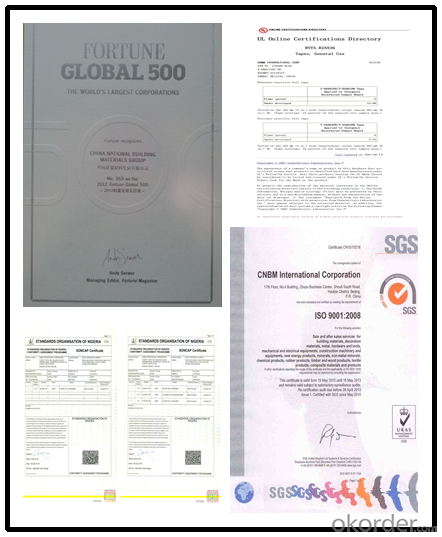
Packaging & Delivery of Special Steel 8620H 40CrNiMoA Iron Steel Round Bar
Packaging Detail | Sea worthy packing /as per customer's packing instruction |
Delivery Detail | 15 ~ 40 days after receiving the deposit |
Products show of Special Steel 8620H 40CrNiMoA Iron Steel Round Bar
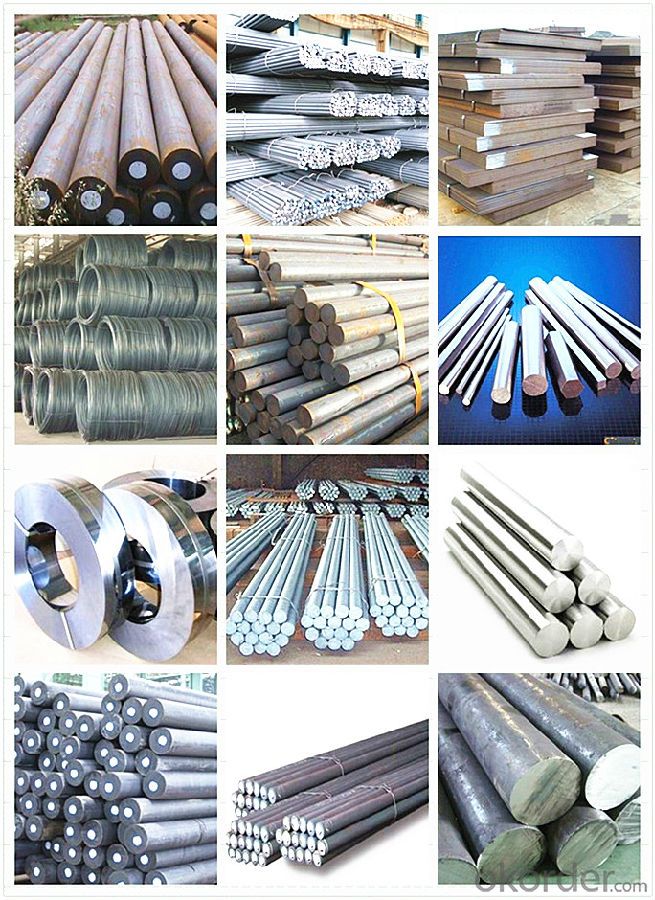
FAQ
Are you a trading company or manufacturer? | Manufacturer |
What’s the MOQ? | 3 metric ton |
What’s your delivery time? | 15-35 days after downpayment received |
Do you Accept OEM service? | Yes |
what’s your delivery terms? | FOB/CFR/CIF |
What's the Payment Terms? | 30% as deposit,70% before shipment by T/T |
Western Union acceptable for small amount. | |
L/C acceptable for large amount. | |
Scrow ,Paybal,Alipay are also ok | |
Why choose us? | Chose happens because of quality, then price, We can give you both. Additionally, we can also offer professional products inquiry, products knowledge train (for agents), smooth goods delivery, excellent customer solution proposals. |
What's your available port of Shipment? | Main Port, China |
What’s your featured services? | Our service formula: good quality+ good price+ good service=customer's trust
|
Where are your Market? | Covering more than 160 countries in the world |
- Q: How is high-temperature steel used in power generation equipment?
- High-temperature steel is used in power generation equipment due to its excellent strength and heat resistance properties. It is specifically utilized in the construction of boilers, turbines, and heat exchangers, where it can withstand extreme temperatures and pressures. This steel ensures the efficient and safe operation of power plants by allowing them to generate electricity through the combustion of fossil fuels or nuclear reactions while enduring high operating temperatures without structural failure.
- Q: How does special steel perform in corrosive chemical environments?
- Special steel, also known as stainless steel, performs exceptionally well in corrosive chemical environments. This is primarily due to its unique composition which includes a high amount of chromium, typically above 10.5%. Chromium forms a passive oxide layer on the surface of the steel, which acts as a protective barrier against corrosion. The passive oxide layer is highly resistant to attack from various corrosive substances, including acids, alkalis, and salts. This makes special steel highly reliable and durable in chemical environments where corrosion is a significant concern. Additionally, special steel exhibits excellent resistance to pitting corrosion, which is a localized form of corrosion that can occur in aggressive chemical environments. This resistance is attributed to the presence of other alloying elements such as nickel and molybdenum, which further enhance the steel's corrosion resistance properties. Furthermore, special steel offers excellent strength and toughness, making it suitable for various industrial applications, including chemical processing plants, oil and gas refineries, and pharmaceutical industries. It can withstand high temperatures and pressures, ensuring long-term performance and reliability even in harsh chemical environments. However, it is essential to note that the performance of special steel in corrosive chemical environments can vary depending on the specific grade and composition of the steel. It is crucial to select the appropriate grade of special steel that is specifically designed for the intended chemical environment to ensure optimal performance and longevity.
- Q: What are the properties of maraging steel?
- Maraging steel is a type of high-strength steel known for its exceptional strength, toughness, and resistance to fatigue. It possesses a unique combination of properties such as high yield strength, excellent fracture toughness, and superior hardness. This steel also exhibits remarkable corrosion resistance and can withstand extreme temperatures. Additionally, maraging steel is highly weldable and machinable, making it suitable for a wide range of applications in industries such as aerospace, defense, and tooling.
- Q: What is the significance of special steel in the medical field?
- Special steel, which is also referred to as medical grade steel, holds a vital role in the medical field due to its distinct properties and importance. Specifically designed and produced to meet the strict requirements of the healthcare industry, special steel's significance in the medical field can be grasped through the following points: 1. Biocompatibility: Special steel demonstrates biocompatibility, meaning it is non-toxic and does not elicit an adverse reaction when it comes into contact with the human body. This makes it an ideal material for medical devices like surgical instruments, implants, and orthopedic tools. 2. Resistance to corrosion: Special steel exhibits high resistance to corrosion and rust, ensuring the endurance and durability of medical instruments. Instruments used in surgical procedures require repeated sterilization, and the corrosive nature of sterilization agents can degrade ordinary steel. Special steel, with its superior resistance to corrosion, can withstand these harsh conditions, decreasing the risk of contamination and preserving the integrity of medical equipment. 3. Mechanical properties: Special steel possesses exceptional mechanical properties, such as high strength, toughness, and ductility. These characteristics are crucial for medical devices as they need to endure the stresses and strains of surgical procedures, maintain their shape, and deliver reliable performance. 4. Compatibility with sterilization: Special steel can withstand various sterilization methods, including steam sterilization, ethylene oxide sterilization, and gamma radiation. This guarantees that medical instruments made from special steel can be effectively sterilized, preventing the transmission of infections and minimizing the risk of contamination during surgeries. 5. Precision manufacturing: Special steel can be shaped into intricate forms and sizes, enabling the production of precise medical instruments. Its superior machinability allows for the creation of fine and sharp edges, which are vital for surgical tools used in delicate procedures. 6. Antibacterial properties: Certain special steels, such as stainless steel, possess inherent antibacterial properties. This characteristic is particularly crucial in the medical field, where preventing infections is of utmost importance. Instruments made from antibacterial special steel can hinder the growth of bacteria, minimizing the risk of post-operative complications. In conclusion, the significance of special steel in the medical field lies in its biocompatibility, resistance to corrosion, mechanical properties, compatibility with sterilization, precision manufacturing, and potential antibacterial properties. These qualities render special steel an indispensable material for the manufacturing of medical devices, ensuring their dependability, durability, and safety for both healthcare professionals and patients.
- Q: What are the challenges in welding special steel?
- One of the main challenges in welding special steel is its high carbon content, which can result in increased hardness and brittleness. This requires careful control of the welding process, including preheating and post-weld heat treatment, to prevent cracking and ensure proper weld strength. Additionally, special steels often have alloying elements that can influence the weldability, such as chromium, nickel, or molybdenum, requiring specific filler materials and welding techniques. Overall, the challenges in welding special steel lie in achieving a strong and defect-free weld while maintaining the desired mechanical properties of the steel.
- Q: How does special steel contribute to the aerospace industry?
- Special steel contributes to the aerospace industry by offering several key benefits. Its high strength-to-weight ratio makes it ideal for constructing lightweight yet durable components, improving fuel efficiency and overall performance of aircraft. Additionally, its exceptional resistance to corrosion, heat, and extreme conditions ensures the longevity and reliability of aerospace structures. Special steel also enables the production of intricate and complex parts, enhancing the design flexibility and safety of aircraft.
- Q: How does special steel contribute to the mining industry?
- Special steel contributes to the mining industry by offering enhanced durability, high strength, and resistance to extreme conditions. It is used in various mining equipment and machinery, such as drills, excavators, and crushers, to withstand the harsh environment and increase efficiency. Additionally, special steel alloys with specific properties are utilized in mining processes like ore extraction and mineral processing, ensuring optimum performance and reducing downtime.
- Q: What is the impact of impurities on the properties of special steel?
- The presence of impurities in special steel can have a significant impact on its properties. Impurities can weaken the steel's structural integrity, reduce its mechanical strength, and compromise its corrosion resistance. High levels of impurities can also affect the steel's ability to be fabricated or shaped into desired forms. Therefore, it is crucial to minimize impurities during the manufacturing process to ensure that special steel maintains its desired properties and performance characteristics.
- Q: What are some innovative applications of special steel?
- Special steel, also known as alloy steel, offers a wide range of innovative applications due to its unique properties and characteristics. Some of these applications include: 1. Aerospace Industry: Special steel is extensively used in the aerospace industry for manufacturing critical components like turbine blades, landing gears, and structural parts. Its high strength, excellent corrosion resistance, and ability to withstand extreme temperatures make it an ideal choice for these applications. 2. Automotive Industry: Special steel finds various applications in the automotive industry, including the production of engine components, suspension systems, and safety-related parts. Its exceptional strength-to-weight ratio and resistance to wear and fatigue ensure improved performance, durability, and safety in vehicles. 3. Medical Devices: Special steel is utilized in the manufacturing of surgical instruments, implants, and medical equipment. Its biocompatibility, high strength, and resistance to corrosion make it suitable for use in implants such as artificial joints, stents, and dental implants. 4. Energy Sector: Special steel plays a crucial role in the energy sector, particularly in power plants, nuclear reactors, and oil and gas facilities. Special steel pipes and tubes are used for conveying fluids and gases, while its high-temperature resistance is essential for components like steam turbines and boilers. 5. Tooling and Machining: Special steel is extensively used in tooling and machining processes due to its exceptional hardness, toughness, and wear resistance. It is employed in the production of cutting tools, dies, molds, and machine components, ensuring high precision, extended tool life, and increased productivity. 6. Defense and Security: Special steel is used in the defense and security sectors for the production of armored vehicles, ballistic protection, and military-grade equipment. Its ability to withstand high impact and provide superior protection against projectiles and explosions make it an essential material in these applications. 7. Construction and Infrastructure: Special steel is widely used in the construction industry for applications such as bridges, high-rise buildings, and infrastructure projects. Its high tensile strength, resistance to corrosion, and durability ensure structural integrity and safety. 8. Renewable Energy: Special steel is employed in the renewable energy sector, particularly in wind turbines and solar energy systems. Its high strength and resistance to fatigue ensure the reliability and longevity of these energy generation systems. In conclusion, special steel offers numerous innovative applications across various industries due to its unique properties. From aerospace and automotive to medical devices and renewable energy, this versatile material continues to drive advancements and meet the evolving needs of modern technology and society.
- Q: What are the properties of boron steel?
- Boron steel, also known as boron-alloyed steel, possesses several unique properties. It is exceptionally strong and has a high tensile strength, making it ideal for applications that require high-strength materials. Boron steel also exhibits good hardenability, meaning it can be hardened by heat treatment processes such as quenching and tempering. Additionally, it has excellent wear resistance and is often used in the manufacturing of cutting tools and wear-resistant components. Moreover, boron steel offers good weldability and formability, allowing it to be easily shaped and joined. Overall, the properties of boron steel make it a valuable material in various industries, including automotive, construction, and tool manufacturing.
Send your message to us
Special Steel 8620H 40CrNiMoA Iron Steel Round Bar
- Loading Port:
- Shanghai
- Payment Terms:
- TT OR LC
- Min Order Qty:
- 3 m.t.
- Supply Capability:
- 100000 m.t./month
OKorder Service Pledge
OKorder Financial Service
Similar products
Hot products
Hot Searches
Related keywords
